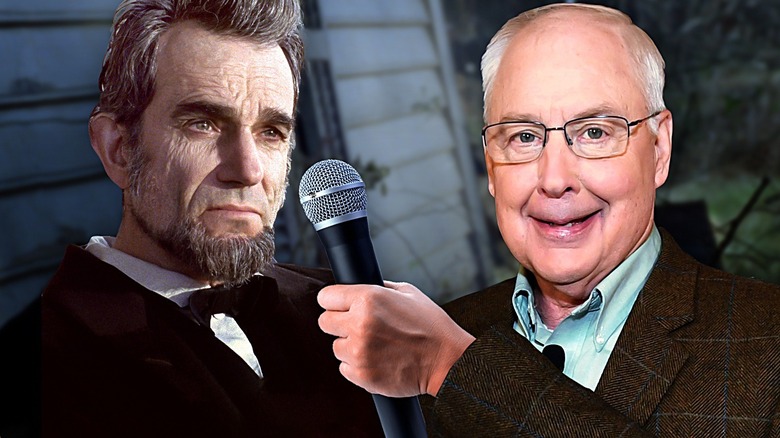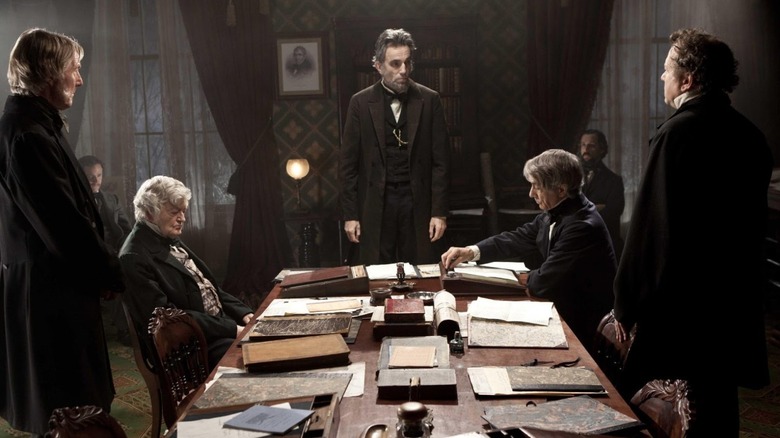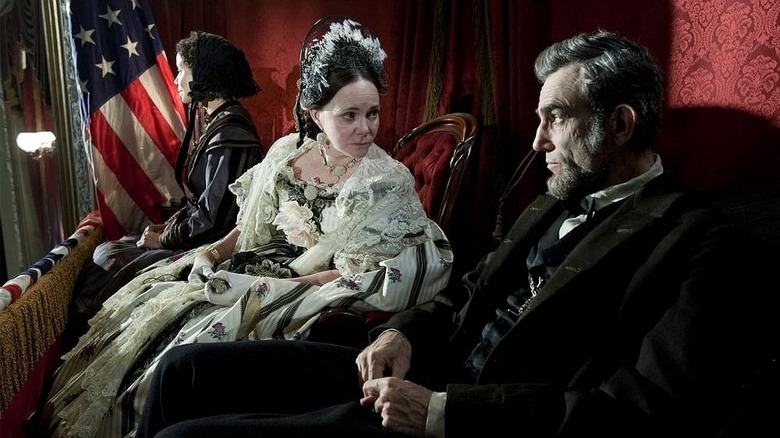Star Wars Sound Designer Ben Burtt Got Rare Presidential Access For Steven Spielberg's Lincoln
Steven Spielberg's 2012 drama "Lincoln" may be considered the second part of a thematic trilogy in the filmmaker's oeuvre. Spielberg, from 2005 through 2017, made three notable historical biographies that dealt with specific historical events, but which were clearly being made to comment on dramatic political events in the present.
2005's "Munich" was about the infamous bombing at the 1972 Munich Olympics, wherein Palestinian forces killed 11 members of the Israeli Olympic team. This plan of political vengeance, however, only begets more violence, and solves nothing. Spielberg ended the film with a pensive shot of the World Trade Center towers. "Lincoln," meanwhile, took place at a time in Abraham Lincoln's life when he tried to pass the 13th Amendment, abolishing slavery. Written by Tony Kushner, the film was clearly a parallel comment on marriage equality. 2017's "The Post," about the notorious Pentagon Papers, was clearly a post-Trump movie. These three films are Spielberg's best.
"Lincoln" was particularly acclaimed, having been nominated for 12 Academy Awards and winning two (for Best Actor and Best Production Design). Notably, for this article, "Lincoln" was also nominated for Best Sound Mixing, another exemplary detail of the film's impeccable production. The film was filled with the ambient noises of 1864, including the mechanical technology, creaky furniture, and vintage timepieces.
Indeed, it was one of those vintage timepieces that sound designer Ben Burtt said helped him construct an actual sound of Abraham Lincoln's personal life. According to Speaking with Variety, Burtt revealed that the Kentucky Historical Society granted him access to the actual pocketwatch that Lincoln had on his person the night he was assassinated. The ticking of Lincoln's pocketwatch is 100% authentic.
Lincoln's pocketwatch
Burtt is perhaps best known in the film industry for his extensive work on the "Star Wars" movies. It was Burtt who invented well-known movie sound effects like the lightsaber hum and R2-D2's beeps and whistles. He also provided the voice for E.T. the Extra-Terrestrial and worked on dozens of other high-profile films besides. Burtt is such a celebrity in the industry, he frequently has "Star Wars" fans approaching him to tell him what an influence his work has been on them personally. As it so happens, Burtt was happy to exploit his fame to get some special favors for "Lincoln."
Burtt admitted to being the tiniest bit peeved that he is still best known for sci-fi and space-bound fantasy films — he has also worked on "Munich," several nature documentaries, and, yes, "Lincoln" — but he was more than happy to play up his "Star Wars" stories for a fanboy. As he recalled:
"I got fewer opportunities to work on films that, well, weren't in space. This one was very straightforward. No creature voices, no spaceships, no big sounds. But the original script had Lincoln taking out his pocket watch all the time. He would look at it while thinking and writing and dreaming. I thought: 'Wouldn't it be great to record the actual watch of Abraham Lincoln?' [...] One was in the Smithsonian, but they were nervous about touching it, let alone winding it up with a key."
The first watch may have been too fragile, but the second worked out. Burtt continued:
"I found out that the Kentucky Historical Society had the watch that Lincoln allegedly had on his body when he was assassinated. Fortunately for me, their curator was a big 'Star Wars' fan."
Time to exploit one's fame.
TikTok: Lincoln edition
Burtt, thanks to his fame, had no issue getting the watch in question. "When I called," Burtt said, "he already knew who I was and immediately agreed to help me. 'Star Wars' enabled me to record Lincoln's watch!" Fame has its advantages.
Moreso, though, Burtt just did the legwork required. In addition to Lincoln's pocketwatch, he was also keen to capture the sounds of other vintage clocks that would have been in the White House in Lincoln's time. Luckily, a lot of the original pieces have been preserved at the White House for over a century and a half, and Burtt was able to record them ticking, just as they did in the past. Burtt wanted the audience to hear what Lincoln did.
Sadly, he related, a lot of his efforts were cut from the final film. He lamented:
"All these scenes were pretty much taken out in the end, and the creative effort I put into it is not something people will know about –- or even care that these are the same sounds Lincoln heard in his life. But I know it."
The effort was still appreciated. Burtt then went on to lament how sharp, unique sound effects are harder to sell in the modern age, when many films are watched on small, palm-sized screens with tiny, tinny speakers or low-quality earphones. There is an ineffable, epic quality to his work, he feels, that is best heard in an enormous room with first-rate speakers and a state-of-the-art sound system. Whether it's the subtle ticking of Lincoln's pocketwatch or the engine noises of a starship, Burtt would prefer that you listen.


